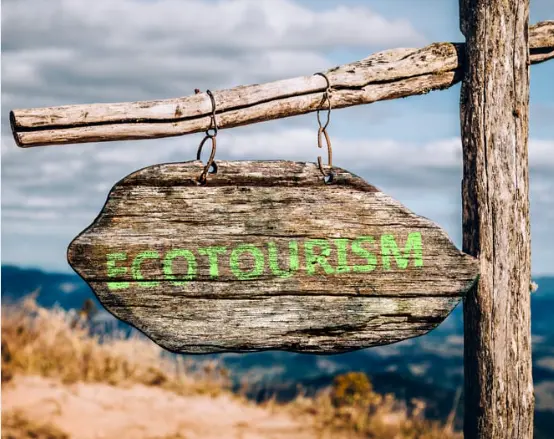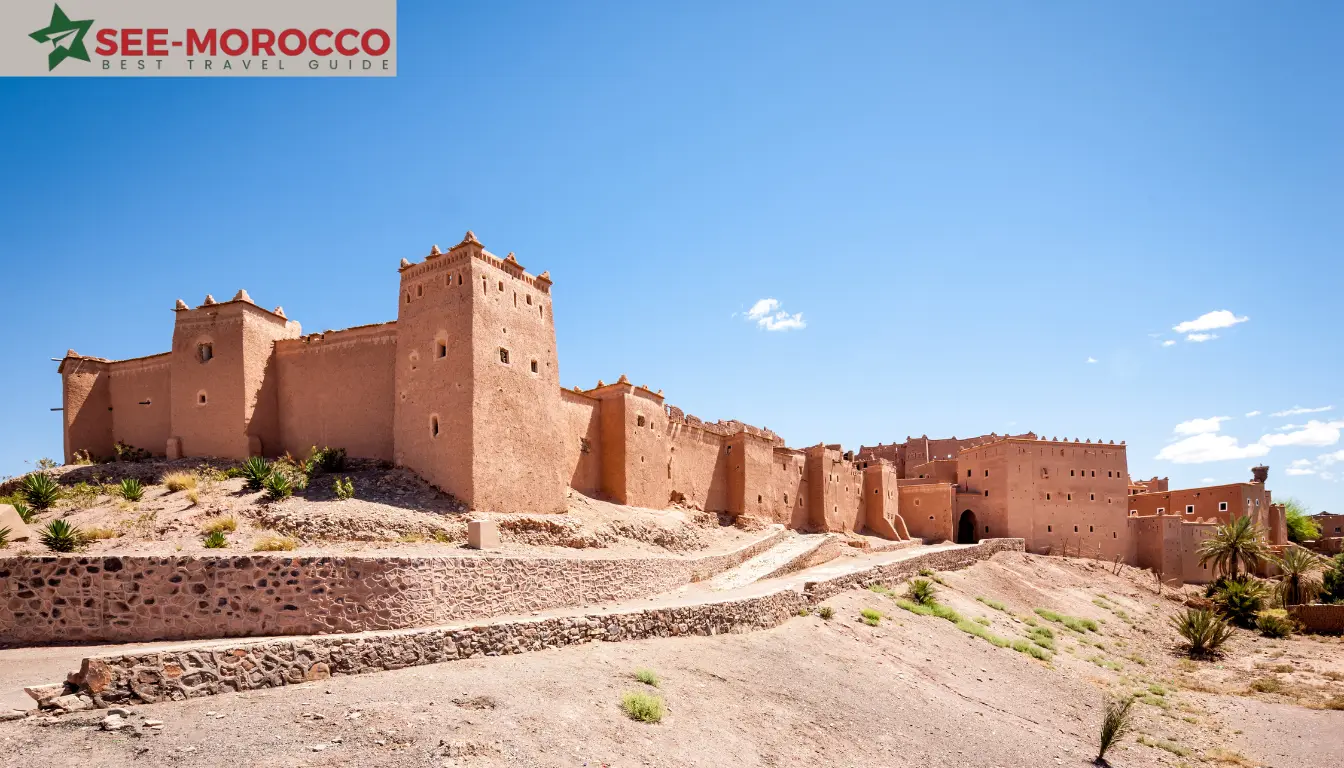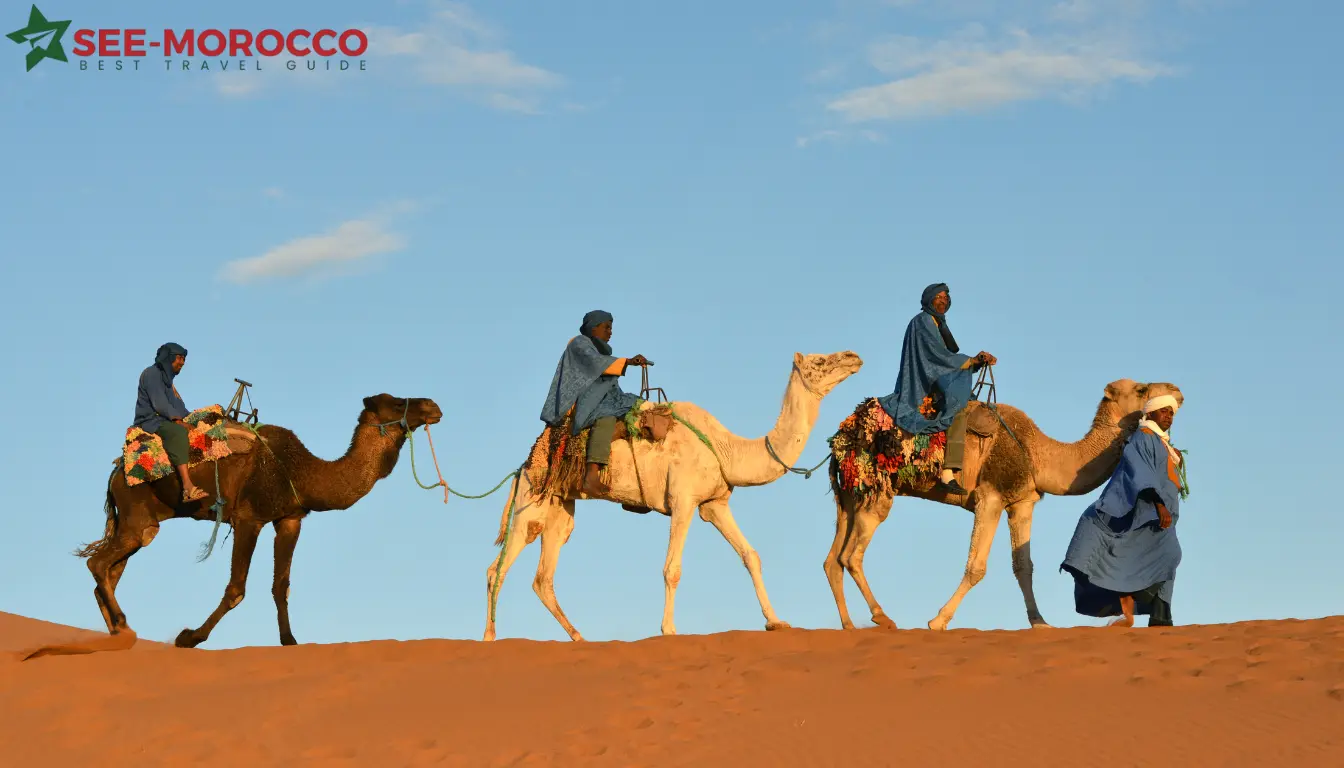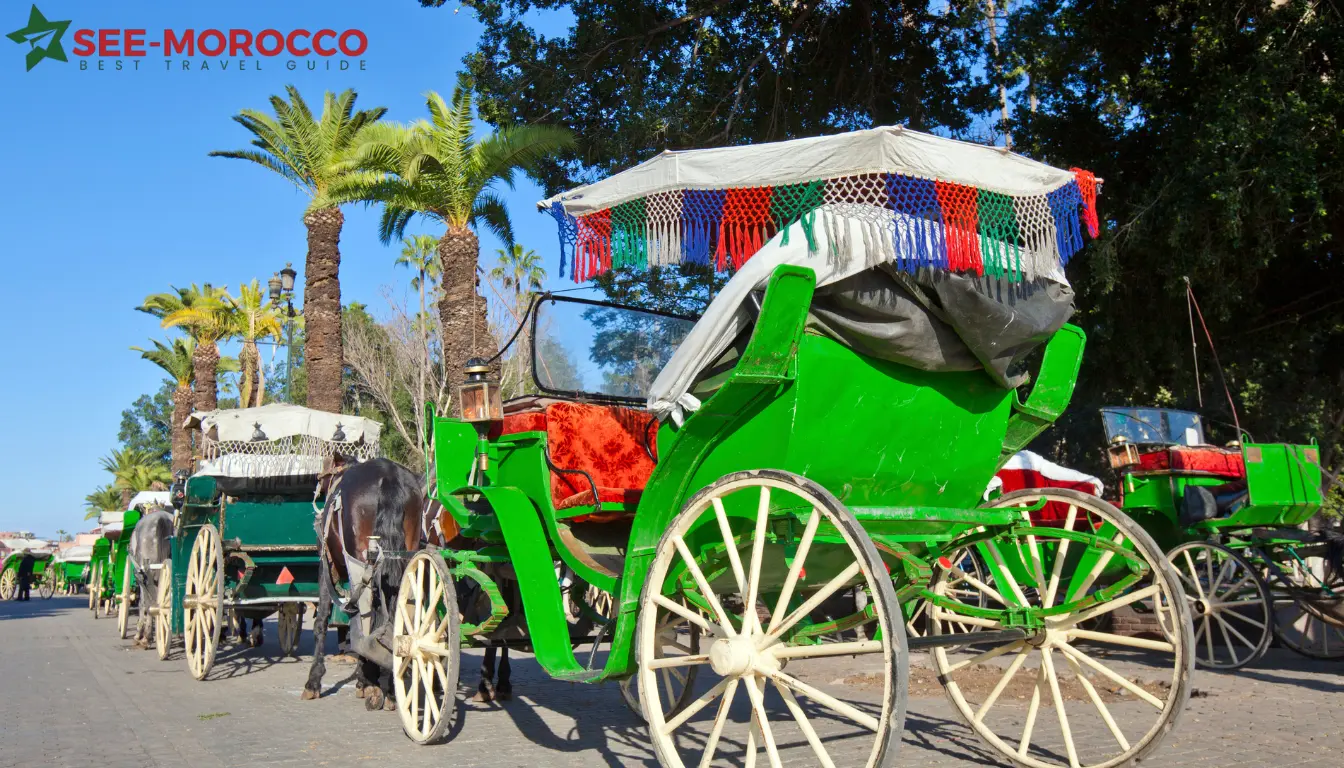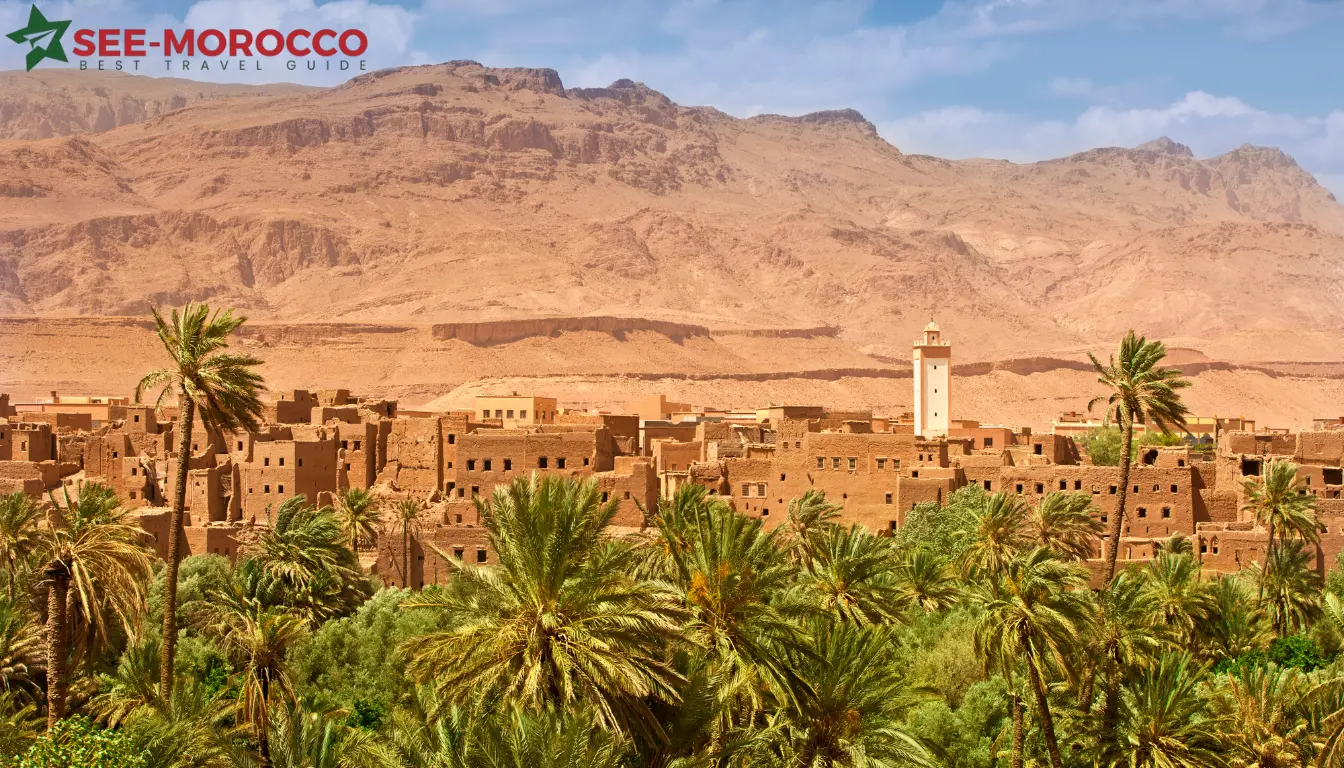Ecotourism in Morocco is a hit with travelers who love nature and culture. The country’s varied landscapes, from the Sahara to the Atlas Mountains, make it perfect for green travel. It lets visitors enjoy Morocco’s beauty while helping local communities and the environment.
Morocco is a top spot for eco-friendly travel. It has many activities, like hiking and wildlife watching, that let you connect with nature and people. By picking eco-friendly tours, you help keep Morocco’s beauty alive and support the local economy.
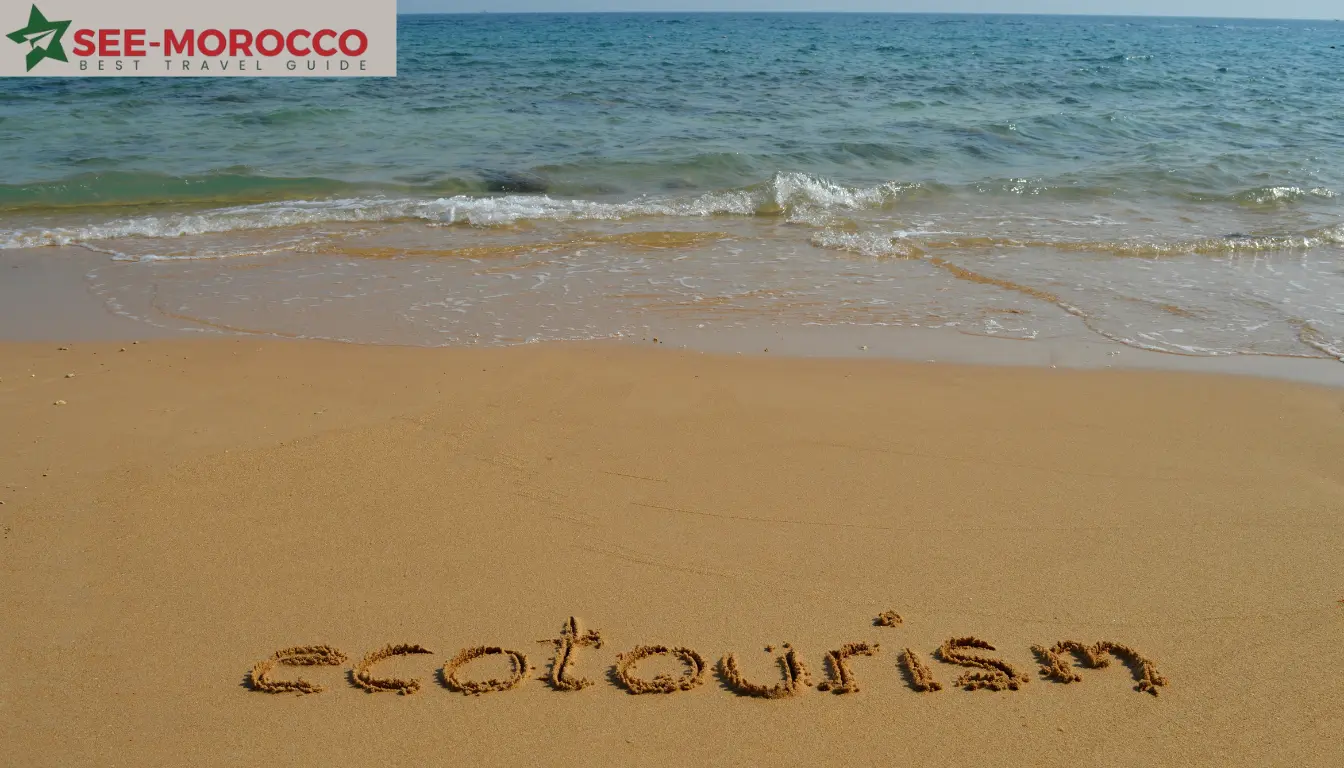
Key Takeaways
- Ecotourism in Morocco offers a unique blend of cultural immersion and eco-friendly adventures
- Sustainable travel in Morocco supports local communities and promotes environmental conservation
- Morocco provides a wide range of activities and experiences for eco-conscious travelers
- Responsible tourism options contribute to the preservation of Morocco’s natural heritage
- Ecotourism in Morocco provides a unique and authentic experience for travelers
- Sustainable travel in Morocco supports community-led initiatives and promotes cultural preservation
Understanding Ecotourism in Morocco
Ecotourism in Morocco is becoming more popular. It combines eco-friendly adventures, nature conservation, and ethical tourism. The country’s varied landscapes, from the Atlas Mountains to the Sahara Desert, are perfect for sustainable travel. Morocco works hard to protect its natural resources and support local communities.
As more people look for sustainable travel, Morocco is ready to meet this demand. Eco-friendly activities like hiking, biking, and wildlife watching offer new ways to connect with locals and help conservation. By picking ethical tourism, visitors help keep Morocco’s beauty and culture alive.
The Rise of Sustainable Travel in North Africa
Sustainable travel in North Africa is growing. People are more aware of the need to protect the environment and support communities. Morocco is leading the way with eco-friendly tourism, reducing waste, conserving water, and helping local communities.
Morocco’s Commitment to Environmental Conservation
Morocco is serious about protecting its environment. It works hard to keep its national parks and wildlife reserves safe. The country also has plans to cut down on waste and save water, making it a great choice for eco-friendly tourists. By choosing ethical tourism, visitors help preserve Morocco’s beauty and support local people.
| Conservation Efforts | Initiatives |
|---|---|
| National Parks | Protection of natural habitats and wildlife |
| Waste Reduction | Implementation of recycling programs and waste management systems |
| Water Conservation | Implementation of water-saving measures and efficient irrigation systems |
Impact of Responsible Tourism on Local Communities
Responsible tourism helps local communities a lot. It supports their economy and helps keep their culture alive. By choosing eco-friendly and ethical tourism, visitors help the well-being of local people and preserve Morocco’s heritage.
The Natural Wonders of Morocco’s Diverse Landscapes
Morocco has a wide range of wilderness experiences for everyone. You can explore the Sahara Desert, the Atlas Mountains, and the coast. It’s a mix of African, Arab, and European cultures, making it a top choice for ecotourism.
Many wonder if Morocco is eco-friendly. The answer is yes. The country works hard to protect its nature and support green tourism. You can go hiking, trekking, camel riding, or desert camping. These activities help the local economy and protect the environment.
Some of the best places for wilderness experiences in Morocco are:
- The Sahara Desert, where you can camp under the stars and see the vast dunes
- The Atlas Mountains, perfect for hiking and trekking with beautiful views
- The coastal regions, great for water sports, beach fun, and helping marine life
Morocco’s varied landscapes and green efforts make it perfect for ecotourism. It offers a unique and real experience for those who love nature.
| Destination | Activities | Conservation Efforts |
|---|---|---|
| Sahara Desert | Camping, camel riding, stargazing | Dune conservation, wildlife protection |
| Atlas Mountains | Hiking, trekking, skiing | Reforestation, soil conservation |
| Coastal Regions | Water sports, beach activities, marine conservation | Marine protected areas, beach cleanups |
Sustainable Desert Adventures in the Sahara
The Sahara Desert in Morocco is a famous spot for sustainable adventures. Tourism in Morocco boosts the local economy and helps protect nature. Visitors can see the desert’s beauty and help eco-friendly projects.
Eco-friendly camps and camel treks are part of the Sahara’s sustainable tourism. These activities offer unique experiences and help protect the desert. They also support the local Berber community. Traditional Berber culture is key to the Sahara’s identity, and tourism helps keep it alive.
Responsible tourism in the Sahara also means supporting local conservation. This includes protecting wildlife and habitats. By choosing eco-friendly options, tourists positively impact the environment and communities. Ways to enjoy sustainable Sahara adventures include:
- Staying in eco-friendly desert camps
- Participating in responsible camel trekking experiences
- Supporting local conservation efforts
- Learning about traditional Berber culture and its significance in the Sahara
In summary, sustainable Sahara adventures are a responsible way to see the desert’s beauty. By supporting eco-friendly projects and conservation, tourists help the environment and communities. This also highlights the value of tourism in Morocco.
| Sustainable Tourism Initiatives | Benefits |
|---|---|
| Eco-friendly desert camps | Support local economy, conserve natural resources |
| Responsible camel trekking experiences | Unique experience, support local Berber community |
| Local conservation efforts | Protect wildlife and natural habitats, support local communities |
Atlas Mountains: A Haven for Eco-Adventure
The Atlas Mountains are a top spot for tourists in Morocco. They offer outdoor fun and beautiful views. For those wondering where to stay, the Atlas Mountains offer a real Moroccan experience. You can hike, bike, and ski here, perfect for eco-adventure lovers.
When planning a trip, consider the best time to visit and where to stay. Morocco has eco-lodges and guesthouses for all budgets. You can also dive into the local culture, trying traditional food and learning about the area’s history.
Some top activities in the Atlas Mountains include:
- Hiking and trekking through rugged landscapes
- Mountain biking and skiing for adventure seekers
- Exploring traditional villages and learning about local culture
For a deep dive into Moroccan life, stay in traditional villages. Here, you can learn about local traditions and enjoy homemade meals. The Atlas Mountains offer a mix of nature and culture, making them a key spot for tourists in Morocco.
| Activity | Best Time | Difficulty Level |
|---|---|---|
| Hiking | Spring and Autumn | Medium |
| Mountain Biking | Summer | Challenging |
| Skiing | Winter | Easy to Challenging |
Coastal Conservation and Marine Ecotourism
Morocco’s coasts are rich in marine life. This makes coastal conservation and marine ecotourism key for these ecosystems’ health. Tourists should know about the morocco tourist tax 2024 and its role in supporting these efforts.
Many tourists visit the what is a medina in morocco to see the culture. But, the coasts offer a special chance for marine ecotourism. Here, tourists can help with sustainable fishing and support marine life conservation.
Protected Marine Areas
Morocco has set up several protected marine areas. These spots are safe for marine life and let tourists see the beauty of Morocco’s coasts.
Sustainable Fishing Villages
Sustainable fishing villages are crucial for Morocco’s coastal conservation. Tourists supporting these villages help promote eco-friendly fishing. This reduces tourism’s environmental impact.
Beach Clean-up Initiatives
Beach clean-up efforts are a great way for tourists to help. By joining these initiatives, they can reduce waste and protect marine life. This makes a big difference for Morocco’s coasts.
Traditional Medinas and Cultural Preservation
When thinking about where to go in morocco, the traditional medinas are a must-see. These historic cities show off Morocco’s rich culture. They have narrow streets, historic buildings, and lively markets.
The medinas are not just a place to see local culture. They are also near the beautiful nature morocco offers.
Some of the top medinas to visit in Morocco include:
- Marrakech Medina, known for its bustling souks and historic landmarks
- Fez Medina, a UNESCO World Heritage Site and one of the oldest medinas in Morocco
- Essaouira Medina, a charming coastal town with a rich history and cultural significance
These medinas give a unique look into Morocco’s past. You can see traditional buildings, lively markets, and historic sites. Visitors can wander the narrow streets, see local artisans, and try the local food. All while enjoying the stunning nature morocco has to offer.
The medinas are also key to Morocco’s tourism. Many efforts are made to keep the country’s unique culture alive. By visiting these medinas, tourists help the local economy. They also help preserve Morocco’s rich cultural heritage. All while enjoying the best of where to go in morocco and nature morocco.
Sustainable Accommodation Options
Exploring Morocco’s rich heritage means choosing places to stay that are good for the planet. Look for eco-lodges or green hotels that follow strict environmental rules. This way, you can see Morocco in a way that’s kind to the earth.
Eco-lodges and Green Hotels
These places mix luxury with green living. They use solar power, collect rainwater, and have organic gardens. Staying here helps local communities and cuts down on pollution.
Community-run Guesthouses
Guesthouses run by locals let you dive into the culture and help the local economy. They serve traditional Moroccan food and offer activities. It’s a great way to really get to know Morocco.
Environmental Certification Standards
Check if places have environmental certifications like the “Green Key” from the Moroccan Ministry of Tourism. It means they follow strict green rules.
Here are some top picks for staying green in Morocco:
- Eco-lodges in the Atlas Mountains
- Green hotels in Marrakech
- Community-run guesthouses in rural areas
Local Food and Agricultural Tourism
Ecotourism in Morocco lets you dive into the country’s rich culture through food and farming. You can join cooking classes, food tours, and farm stays. This way, you get to know the local food and farming ways.
Some top activities for this include:
- Visiting traditional souks to try local produce and spices
- Joining cooking classes to learn about Moroccan dishes
- Staying on farms or rural guesthouses to see farming up close
These activities give you a special look at Moroccan culture. They also help local communities and support green travel. By choosing ecotourism in Morocco, you help keep traditional farming alive and support rural growth.
Morocco is a great place for sustainable travel, with many cultural, green, and community-focused experiences. By supporting local food and farming tourism, you help Morocco’s rich culture and heritage stay alive.
| Activity | Location | Duration |
|---|---|---|
| Cooking classes | Marrakech | Half-day |
| Farm stays | Rural areas | Multi-day |
| Food tours | Various cities | Full-day |
Wildlife Conservation Projects and Nature Reserves
Morocco’s diverse landscapes are home to many wildlife species. Conservation efforts are key to protect these animals. Responsible tourism helps support these projects, like protecting endangered species and bird watching.
Eco-friendly adventures like hiking and camping are available in Morocco’s nature reserves. These places offer a chance to see the country’s beauty while helping conservation. Some important projects and reserves in Morocco include:
- Endangered species protection programs, such as the Barbary macaque conservation project
- Bird watching initiatives, such as the Morocco Birding Tour
- Conservation volunteer programs, such as the Wildlife Conservation Society
These efforts not only protect Morocco’s wildlife but also give tourists a chance to engage in eco-friendly activities. By supporting these projects, tourists help keep Morocco’s ecosystems healthy. This promotes sustainable tourism.
Morocco’s wildlife conservation projects and nature reserves are a great chance for tourists. They can enjoy responsible tourism and eco-friendly adventures while helping conservation and sustainability.
| Conservation Project | Location | Objective |
|---|---|---|
| Barbary macaque conservation project | Atlas Mountains | Protect the endangered Barbary macaque |
| Morocco Birding Tour | Throughout Morocco | Promote bird watching and conservation |
| Wildlife Conservation Society | Various locations | Support conservation volunteer programs |
Sustainable Transportation in Morocco
Exploring Morocco’s diverse landscapes and cultures can be done in a way that’s good for the environment. Options like public transport, cycling, and walking let you dive deep into cultural immersion and connect with locals. These methods are perfect for experiencing the real Morocco, from Marrakech’s lively streets to the Atlas Mountains’ rugged beauty.
Using sustainable transport for wilderness experiences in Morocco is a great idea. For instance, cycling through the Atlas Mountains lets you see amazing views and meet Berber communities. Walking through Marrakech and Fez’s medinas offers a chance to really get to know the local culture.
- Public transportation, such as buses and trains
- Cycling, either on a guided tour or independently
- Walking, either on a guided tour or independently
These choices not only help the environment but also give you a real taste of Morocco’s cultures and landscapes.
By picking sustainable transport, you help keep Morocco’s beauty and culture alive. This way of traveling also supports local communities and offers cultural immersion and wilderness experiences that you’ll never forget.
| Transportation Option | Environmental Impact | Cultural Immersion |
|---|---|---|
| Public Transportation | Low | High |
| Cycling | Low | High |
| Walking | Low | High |
Cultural Immersion and Community Benefits
Morocco is a standout in ecotourism, thanks to its rich culture and community efforts. It’s often asked is Morocco eco-friendly?. The answer is yes, thanks to its focus on sustainable tourism. Visitors get to dive into Morocco’s real traditions and customs.
Initiatives like fair trade workshops and community-led tours are key. They offer a unique look at Morocco’s history and culture. They also support local education, helping preserve Morocco’s heritage.
By joining these efforts, travelers learn a lot about Morocco’s culture. They also help the local community. This makes Morocco a top choice for those looking for the best ecotourism.
Best Seasons for Eco-friendly Travel
Planning a trip to Morocco means thinking about the best seasons for eco-friendly travel. The country’s varied landscapes and climates are perfect for outdoor adventures. You can hike in the Atlas Mountains or trek in the Sahara Desert. The Marrakech Medina is a famous spot, full of culture and commerce.
Tourism is key in Morocco because of its rich culture and natural beauty. It helps local communities and supports environmental efforts. By picking eco-friendly travel, visitors can lessen their environmental impact and help the local economy.
Spring and autumn are the best times for eco-friendly travel in Morocco. The weather is mild, making it great for outdoor activities. These seasons let you explore the country’s wonders, from the Atlas Mountains to the Sahara Desert. Choosing the right season and travel options makes your trip unforgettable.
- Spring: March to May, ideal for hiking and trekking
- Autumn: September to November, perfect for outdoor exploration and cultural events
By picking the best seasons and responsible tourism, visitors support sustainable tourism in Morocco. They also help the local economy.
Environmental Challenges and Solutions
When tourists visit Morocco, they might not see the environmental challenges that tourism brings. Water is a big concern because it’s scarce. Hotels and resorts are using water-saving devices like low-flow showerheads to cut down on water use.
Waste management is another big issue. More tourists mean more waste. To tackle this, recycling and proper waste disposal are being promoted. Tourists can choose eco-friendly places to stay that focus on reducing waste.
Initiatives to tackle these challenges include:
- Renewable energy projects, such as solar and wind power, to reduce reliance on fossil fuels
- Sustainable transportation options, such as electric or hybrid vehicles, to reduce carbon emissions
- Environmental education programs, to raise awareness about the importance of conservation and sustainability
By choosing eco-friendly places to stay, tourists can help reduce their impact. Whether you’re after a beach vacation or an adventure in the Atlas Mountains, there are many sustainable options in Morocco.
| Initiative | Description |
|---|---|
| Water Conservation | Implementing water-saving measures, such as low-flow showerheads and toilets |
| Waste Management | Implementing recycling programs and waste reduction initiatives, such as composting and proper disposal of hazardous materials |
| Renewable Energy | Implementing renewable energy projects, such as solar and wind power, to reduce reliance on fossil fuels |
Planning Your Sustainable Moroccan Adventure
When planning your trip to Morocco, keep in mind the morocco tourist tax 2024. It might change your travel plans. Knowing what a medina in Morocco is can also help you enjoy the country’s historic cities more.
A medina is a traditional Moroccan city or town. It’s often surrounded by walls and has narrow streets, markets, and historic landmarks. Exploring a medina is fascinating. It gives you a peek into Morocco’s rich history and culture.
To plan a sustainable Moroccan adventure, consider these tips:
- Research eco-friendly accommodations and transportation options
- Learn about local customs and traditions to respect the culture
- Support local communities by purchasing products from fair trade artisans
By following these steps, you can reduce your environmental impact. You’ll also help the local economy. This makes your trip to Morocco positive and sustainable.
Responsible Travel Tips and Guidelines
Exploring Morocco’s rich heritage requires respect for local culture and environment. To travel responsibly, follow these guidelines.
Responsible travel means respecting local customs and traditions. It also means being mindful of the environment and supporting local communities.
Cultural Respect Guidelines
- Learn about local customs to avoid unintentionally offending people.
- Respect dress codes and modesty, especially in mosques or rural areas.
- Support local artisans and fair trade to promote Moroccan heritage.
Environmental Best Practices
To reduce your environmental impact, follow these tips:
- Conserve water and energy in your accommodations.
- Reduce plastic use and waste by avoiding single-use items.
- Choose eco-friendly tour operators and support sustainable tourism.
By following these tips, you help preserve Morocco’s heritage. You’ll also have a positive experience for yourself and the locals. Travel with respect and care for the environment, and you’ll get a unique and authentic experience.
Conclusion
Travelers today want experiences that are meaningful and good for the planet. Ecotourism in Morocco is a key way to protect its natural beauty and cultural heritage. By choosing sustainable travel, visitors can dive into Moroccan traditions and help the environment.
From the Atlas Mountains to the Sahara Desert, Morocco’s diverse landscapes await. Exploring them in a way that’s good for the planet is a unique chance. It lets travelers see Morocco’s beauty while helping its communities and ecosystems.
Choosing responsible tourism helps protect Morocco’s delicate nature and supports local people. It also lets visitors truly appreciate Morocco’s rich culture. With Morocco leading in sustainable growth, the future of ecotourism here is promising. It invites everyone to travel in a way that makes a positive difference.
FAQ
What is ecotourism in Morocco?
Ecotourism in Morocco means traveling in a way that’s good for the environment. It lets you see the country’s beautiful landscapes, cultures, and wildlife. You can go hiking, trekking, watch wildlife, and learn about local cultures. It’s all about being kind to nature and helping local people.
How is Morocco committed to environmental conservation?
Morocco is serious about protecting the environment. It has set up marine protected areas and encourages sustainable fishing. The country also uses renewable energy to lessen tourism’s environmental footprint.
It even has a program called “Green Key” to reward places that do things the right way.
What are the benefits of ecotourism in Morocco?
Ecotourism in Morocco helps save the country’s natural and cultural treasures. It also helps local communities by creating jobs and boosting the economy. Plus, it makes tourism less harmful to the environment.
Travelers get to have real, authentic experiences. They can live like locals and help protect Morocco’s diverse ecosystems.
What are some of the popular ecotourism activities in Morocco?
In Morocco, you can hike in the Atlas Mountains or ride camels in the Sahara. You can also watch birds in nature reserves or explore old medinas. There are even chances to stay in eco-lodges and support local projects.
How can travelers practice responsible tourism in Morocco?
To travel responsibly in Morocco, respect local customs and dress right. Use less water and energy, and throw away trash properly. Choose green transport and pack smart to reduce waste.
What are the best seasons for eco-friendly travel in Morocco?
The best times for eco-friendly travel in Morocco are spring (March-May) and autumn (September-November). These months are cooler and less busy, perfect for outdoor adventures. Summer is too hot, and winter can be rainy and chilly.
What environmental challenges does Morocco face, and how are they addressed?
Morocco deals with water scarcity, waste, and tourism’s impact on nature. It’s working on water saving, renewable energy, and waste management. These efforts aim to lessen tourism’s environmental harm and support sustainable growth.
How can travelers plan a sustainable Moroccan adventure?
For a sustainable trip to Morocco, choose eco-friendly places to stay and use green transport. Join tours that help local communities and protect nature. Research and book with companies that focus on sustainable tourism for a better experience.
